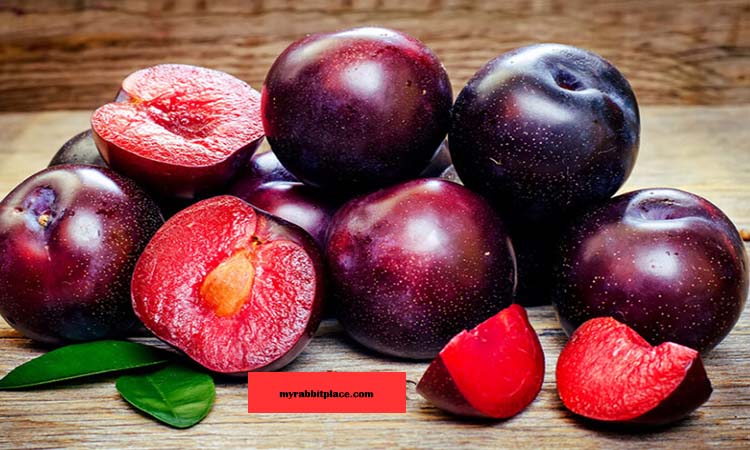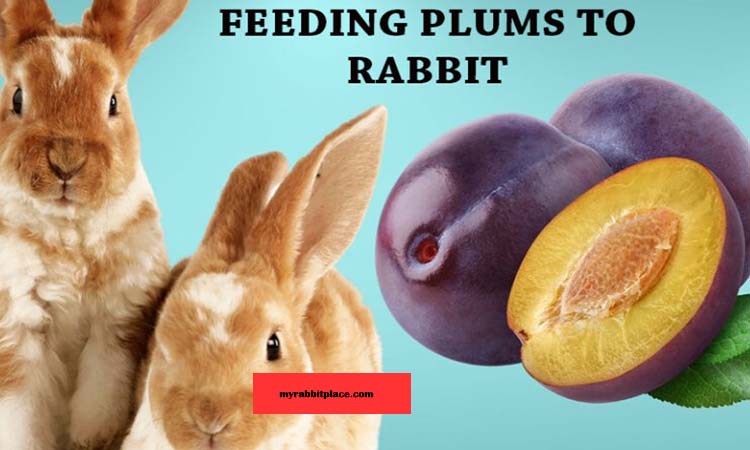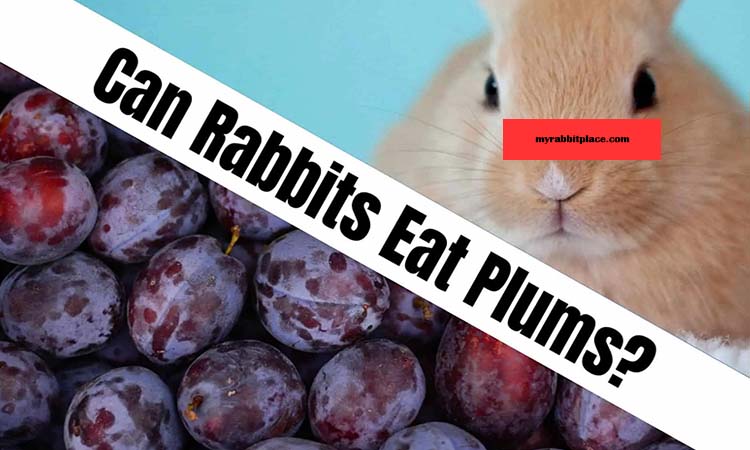The pleasant journey to become a rabbit owner opens up an avenue of happiness and in addition, a range of considerations about what our four-legged friends eat. A popular question regarding rabbit care is whether these cute animals can enjoy the sweetness of plums.
Here, we will take a look at the fruity world of rabbit nutrition trying to explore opportunities and possible pitfalls that can come with plums being included in their diet. The interesting question behind those adorable nose-twitching movements and playful jumps – can rabbits eat plums.
Also, treading carefully is required when introducing plums to a rabbit’s diet as there is a thin line between welcome treats and potential health hazards. However, plums have a lot of sugar making them dangerous for rabbits if they are not fed cautiously. Again, let us begin blogging about the topic.
Plum Nutrition for Rabbits
Owing to their succulent sweet flesh, plums have always been considered as potential addition to the rabbit diet. Do these inviting fruits really suit rabbits? Moderately is the answer.
They bring with them a nutritional record that is full of indispensable elements such as vitamin A and C which are vital in sustaining the general health of a rabbit. Most importantly, giving them controlled portions is what counts when considering their high natural sweetness.
Moreover, make sure your rabbit gets benefits from these nutrients without putting themselves at risk of possible health hazards.

Moderation is Important
Incorporating plums into your rabbit’s feeding regime calls for subtlety based on moderation. However, despite their nutritional benefits, one disadvantage associated with plums like other fruits is that they contain very high levels of sugar. This may be dangerous if eaten in excess quantities.
So offer a moderate amount of plum in small chunks every now and then. This way, your bunny will enjoy fruity flavors without getting exposed to risks that are linked to too much sugar ending up in its body systems.
It is in this delicate balancing act that attention is focused on making a savory addition to the rabbit’s diet and at the same time maintaining dietary equilibrium.
Precautions and Preparation
Before including plums into your bunny’s diet, you should observe several safety measures. First, take out the stones, and chop them into smaller bits which are suitable for easy eating and to prevent choking or other forms of danger. Make sure to thoroughly rinse off any pesticides or contaminants from the fruits.
These stages ensure that rabbits are safe and thrilled. Simply give them a small piece as a test to ascertain if there would be any negative reactions observed. If you notice them enjoying it, occasionally continue treating your rabbit with this fruity delight.
To do this safely, and peacefully; one must take precautions like bunnies’ preference for such taste and flavoring before introducing this fruit into their diets.
Also Read - Can Rabbits Eat Parsley? Check Nutritional Benefits of Parsley for Rabbits.
Watch for Reactions
It is important to observe her reaction when you introduce plums to your rabbit’s diet. Rabbits have different responses to new food because of their distinct digestive systems. Keep an eye on your bunny for some time after feeding it plums, looking for possible stomach problems or change in behavior.
Watch the rabbit closely so as to know if it takes plums positively and whether or not it can tolerate them. The best indication is when they eat them without any sign of dislike; this means you can continue giving them once in a while as a treat.
With personalized observation of your furry friend, it would be prudent to observe his aversion to plumage. This makes their experience with this food special and enjoyable.
Advantages and Disadvantages of Feeding Plums to Rabbit
Advantages of Feeding Plums to Rabbits
- Rabbits’ health benefits from plums since they are rich in vitamins like A and C which are important to their health.
- In rabbits, plums help maintain normal intestinal health and prevent gastrointestinal problems by supplying dietary fiber.
- The natural sweetness of a plum would be very wonderful to bunnies because their everyday meal could be made more interesting through such an approach.
Disadvantages of Feeding Plums to Rabbits
- It is crucial to know that plums are high in sugar and too much consumption of them may result in conditions such as overweight or dental problems.
- The fruit’s sweetness along with its potential for a higher sugar content means that feeding it prudently is vital if the rabbit owner wishes to avoid any negative effects from the plum sugar amount.
- Since each rabbit is unique, some may be sensitive or allergic animals thus owners must watch out for their response upon introducing new delicacies like plums.

Substitutes of Plums for Rabbit
When looking for suitable alternatives, consider fruits that are safe, highly nutritious and have low sugar levels. For instance:
Berries: In comparison to plums, blueberries, strawberries, and raspberries are rich in antioxidants and have low sugar content.
Apple Slices: For a crunchy and healthy treat small apple slices can be offered but before giving remove the seeds.
Pear Slices: Pears can also be an option when they are cut into small sizes like apples and given in moderation.
Melon Chunks: Seeds and rinds should however be taken out of watermelon, cantaloupe or honeydew but they can also make refreshing choices.
Pineapple Chunks: Small portions of fresh pineapple can be served as scrumptious tropical treats.
Papaya Chunks: This fruit is safe if given sparingly because it contains vitamins and enzymes that are needed for rabbits.
Remember, it’s always good to consult a vet for advice on how you can custom your rabbit’s diet. Furthermore, take the time when introducing new foods to them while making sure snacks should always be fed in moderation so that the right nutrition is kept resulting into good health.
FAQ
Can rabbits eat plums?
Yes, rabbits can eat plums in moderation. They have vitamins A and C that are important in the rabbit’s general performance. However, these should be provided as occasional treats rather than regular parts of their meals.
Are there any precautions when feeding plums to rabbits?
Certainly; some measures need to be put in place while giving the bunnies plum fruits. Also, prune out the seed since it may block your pet’s throat and cut it into small pieces that your small animal can easily swallow without any problem. Moreover, cleaning up the plum nicely is vital as this will ensure the elimination of pesticides or other impurities from its skin.
Can rabbits have plum pits?
No way! Rabbits shouldn’t be given such bones; they may choke on them and also suffer from stomach upsets. When you give a bunny a plum, make sure that you first remove its pit.
How often can I give plums to my rabbit?
Plums are high in sugar content compared to other fruits thus they should only be given occasionally as treats for your pet. Avoid feeding your pets with more than the required quantities within a short time because this may lead to digestion-related problems.
How do I know if my rabbit is having any complications after eating plums?
Please watch out for any possible changes in behavior or stomach upsets in your rabbit after giving it plums. You should consult a veterinary officer once you witness some unusual characteristics in the animal.
May rabbits eat dried prunes (plums)?
I would suggest against serving rabbits dried prunes or plums since they have a higher sugar concentration which might be too intense and result into digestive issues for rabbits.
Conclusion
Plums as a constituent of your bunny’s treat collection can be both enjoyable and healthy provided it’s done in moderation. Plums contain vitamins A and C which are beneficial to the health status of your rabbit.
Nevertheless, care should be taken by removing the plum pit, washing and cutting it into edible pieces before giving to the rabbit. Like any other new inclusion in the diet of your pet rabbit, closely monitor their reactions and consult with a veterinary officer if you detect anything unusual.
In addition, occasional sharing of such seasonal treats will enable for quality bonding time between owner and pet whilst not neglecting its welfare.


